Pop punk
| Pop punk | |
|---|---|
| Other names | Punk-pop |
| Stylistic origins | |
| Cultural origins |
|
| Typical instruments | |
| Fusion genres | |
| Regional scenes | |
| |
| Other topics | |
Pop punk (also known as punk-pop or pop-punk) is a rock music genre that fuses elements of pop music with punk rock. Fast tempos, loud electric guitar distortion, and power chord changes are typically played under pop-influenced melodies, vocal styles with lighthearted lyrical themes including boredom and teenage romance.
Early punk rock bands such as Ramones, Buzzcocks, the Dickies, Misfits, the Undertones, and the Adicts, all had strong sense of melody, taking some cues from power pop. By the end of the 1980s several bands began to fuse pop melodies with hardcore punk to create a newer, faster pop punk sound, including Dag Nasty, Bad Religion, the Nip Drivers, TSOL, Hüsker Dü, M.I.A, the Zero Boys, Social Distortion, the Adolescents, and the Descendents. Pop punk in the United States began to grow in popularity in the mid-to-late 1980s, especially in California where independent record labels (most notably Lookout Records) adopted a do it yourself (DIY) approach to releasing music.
By the mid-1990s a number of pop punk bands, including Green Day, Operation Ivy (whose popularity dramatically increased in the mid-90s, despite breaking up in 1989), and the Offspring had begun to sell millions of records and receive extensive radio and television airplay. By 1994, pop punk was quickly growing in mainstream popularity. The late 1990s, exemplified by the 1999 release of Blink-182's Enema of the State, represented the genre's mainstream peak, although some pop punk bands scored successful album chartings in the 2000s. During the 2000s emo pop, a fusion between emo and pop punk, received commercial success. By the end of the 2000s, the pop punk sound of the 1990s had largely waned in mainstream popularity.
Characteristics
Pop punk typically merges upbeat pop melodies with catchy hooks, catchy choruses, harmonies, speedy tempos, punk rock power chord changes and loud, distorted electric guitars.[1][2][3] About.com has described second-wave pop punk bands as having "a radio friendly sheen to their music, but still maintaining much of the speed and attitude of classic punk rock".[2] According to The A.V. Club, pop punk often pits "sweet harmonies against bratty, rowdy riffs".[3] Lyrical topics that are common in pop punk include love, lust, drunkenness, adolescence, cartoonish violence and drugs. Some pop punk lyrics focus on jokes and humor.[3] Some pop punk music features elements of alternative rock,[1] power pop,[3][1] emo[4] or skate punk.[5] According to Ryan Cooper of About.com, "pop punk is a style that owes more to the Beatles and '60s pop than other subgenres of punk".[6]
History
Origins (1974–1979)
It is not clear when the term "pop punk" was first used, but pop-influenced punk rock had been around since the mid to late 1970s.[8] Protopunk and power pop bands of the late 1960s and early 1970s helped lay the groundwork for the pop punk sound, which emerged at the onset of punk rock around 1974 with the Ramones.[9] The Beatles, the Kinks and the Beach Boys all paved the way for pop punk.[3][10] With their love of the Beach Boys and late 1960s bubblegum pop, the Ramones paved the way to what became known as pop punk.[11] The Ramones' loud and fast melodic minimalism differentiated them from other bands in New York City's budding art rock scene, but pop punk was not considered a separate subgenre until later. An early use of the term "pop punk" appeared in a 1977 New York Times article, "Cabaret: Tom Petty's Pop Punk Rock Evokes Sounds of 60s".[12]
In the late 1970s, English band Buzzcocks and Northern Irish band The Undertones combined pop-style tunes and lyrical themes with punk rock's speed and chaotic edge.[13][14][15][16] The Buzzcocks' 1979 compilation album Singles Going Steady has been called "the blueprint for punk rock bands preferring tuneful tales of lost love and longing to rage against the machine."[17] The music of other UK bands, such as Generation X, 999 and The Jam,[18] featured poppy melodies as well as lyrics that sometimes dealt with relatively light themes such as teenage romance. Many UK mod revival bands of the late 1970s and early 1980s also displayed pop punk characteristics.
Emergence (1979–1993)
The American band Bad Religion, formed in 1979, also helped to lay the groundwork for contemporary pop punk.[19][20][21] Bad Religion and some of the other leading bands in Southern California's hardcore punk scene emphasized a more melodic approach than was typical of their peers. According to music journalist Ben Myers, Bad Religion "layered their pissed off, politicized sound with the smoothest of harmonies". Meyers wrote that Descendents "wrote almost surfy, Beach Boys-inspired songs about girls and food and being young(ish)".[22] Their positive yet sarcastic approach began to separate them from the more serious hardcore scene. The Descendents' 1982 debut LP Milo Goes to College provided the template for the United States' take on the more melodic strains of first wave punk.[17] In addition to the California scene, the Minnesota band Hüsker Dü, formed in 1979, fused blistering hardcore punk with a highly melodic, 1960s pop influenced songwriting approach, paving the way for alternative rock. Music writer Michael Azerrad asserted in his book Our Band Could Be Your Life (2001) that "Hüsker Dü played a huge role in convincing the underground that melody and punk rock weren't antithetical." In the 1980s, the term pop punk was used in publications such as Maximum RocknRoll to describe bands similar to Social Distortion, Agent Orange, The Nip Drivers and T.S.O.L..[23] Bands such as The Vandals and Guttermouth also contributed to the development of pop punk by creating a style that blended pop melodies with humorous and offensive lyrics.
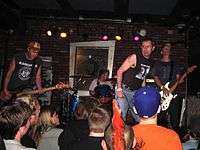
Pop punk in the United States began to grow in popularity in the late 1980s especially in California due to bands like Dag Nasty and All, but the genre was not yet considered commercially viable by major US record labels. Bands such as Bad Religion, Descendents, and The Vandals began to inspire the formation of bands like The Offspring (1984) and the more melodic Green Day (1987), although it would take a number of years for these new bands to achieve mainstream popularity. As these new bands came into the scene, they were exposed to criticism for not representing the punk image as it originated in the 1970s, most notably by Sex Pistols frontman John Lydon. Many pop punk bands espoused a do it yourself (DIY) approach to their music, and a number of independent record labels emerged during this period, often run by band members who wanted to release their own music and that of their friends. During this period several independent labels were formed that would achieve much notoriety and commercial success in the 1990s, namely Epitaph Records (1987), Lookout Records (1987), and Fat Wreck Chords (1990). During the 1980s and early 1990s, pop punk bands such as The Queers,[7] The Mr. T Experience,[24] Jawbreaker[25] and Screeching Weasel[7] emerged. Some of these bands, including Screeching Weasel,[7] The Queers[7] and The Mr. T Experience,[24] were signed to the record label Lookout! Records, which also signed Green Day.[24]
Mainstream success (1994–2009)
In 1993, California's Green Day and Bad Religion were both signed to major labels, and by 1994, pop punk was quickly growing in mainstream popularity. Many punk rock and pop punk bands originated from the California punk scene of the late 1980s, and several of those bands, especially Green Day and The Offspring, helped revive interest in punk rock in the 1990s.[26]

Green Day arose from the 924 Gilman Street punk scene in Berkeley, California.[27] After building an underground following, the band signed to Reprise Records and released their major-label debut album, Dookie, in 1994. Dookie sold four million copies by the year's end and spawned several radio singles that received extensive MTV rotation, three of which peaked at number one on the Modern Rock Tracks chart.[28] Green Day headlined Lollapalooza and Woodstock 1994 and were nominated for four Grammy Awards and won in the category for Best Alternative Album. Green Day's enormous commercial success paved the way for other North American pop punk bands in the following decade.[29] Green Day's song "Longview" peaked at number 1 on the Modern Rock Tracks chart[30] and number 36 on the Radio Songs chart.[31] Green Day's song "Basket Case" peaked at number 16 on the Mainstream Top 40 chart.[32] Green Day's song "When I Come Around" peaked at number 6 on the Radio Songs chart[31] and number 2 on the Mainstream Top 40 chart.[32] Green Day's album Dookie was certified diamond by the Recording Industry Association of America in 1999.[33] The Offspring also achieved mainstream success in the mid-1990s; its album Smash was certified 6x platinum by the Recording Industry Association of America in 2000,[34] selling 6,300,000 copies in the United States.[35]
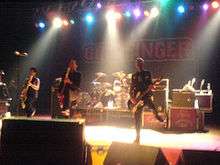
MTV and radio stations such as Los Angeles' KROQ-FM played a major role in the genre's mainstream success.[36] KROQ's steady airplay of a remix of Face to Face's song "Disconnected" led the band to re-record the track for their 1994 album Big Choice, which sold over 100,000 copies.[37][38] Meanwhile, Bad Religion's album Stranger Than Fiction (1994) was certified gold.[39] Rancid's songs "Time Bomb" and "Ruby Soho" were on the Radio Songs chart in the mid-1990s.[40] The band's album ...And Out Come the Wolves was certified platinum by the Recording Industry Association of America.[41] In the aftermath of the 1994 punk breakthrough, bands such as Rancid and Face to Face were the subject of major-label bidding wars and lucrative deals.[28] The Australian bands Frenzal Rhomb and Bodyjar established followings in Japan.[42] Goldfinger's song "Here in Your Bedroom" peaked at number 47 on the Radio Songs chart[43] and number 5 on the Modern Rock Tracks chart.[44]
The Warped Tour and the mall chain store Hot Topic brought punk even further into the United States mainstream.[45] With punk rock's renewed visibility came concerns among some in the punk subculture that the music was being co-opted by the mainstream.[36] Some punk rock fans criticized Green Day for "selling out" and rejected their music as too soft, pop-oriented and not legitimate punk rock.[28][46][47] They argued that by signing to major labels and appearing on MTV, bands like Green Day were buying into a system that punk was created to challenge.[48]
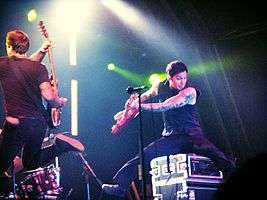
Blink-182 broke into the mainstream with their 1997 album Dude Ranch. Dude Ranch was certified platinum by the Recording Industry Association of America in 1999.[49] Dude Ranch's song "Dammit" peaked at number 61 on the Radio Songs chart in February 1998.[50] Eve 6 released their self-titled debut album on RCA Records in April, which peaked at number one on the Top Heatseekers chart and number 33 on the Billboard 200 chart. The album's song "Inside Out" peaked at number 28 on the Billboard Hot 100.[51] In November 1998, Eve 6' self-titled debut album was certified platinum by the Recording Industry Association of America.[52] In June, Southern California act Home Grown released their sophomore album Act Your Age on Geffen subsidiary Outpost Recordings. It was their first album to chart, peaking at number 24 on the 1998 Billboard Heatseekers.[53] The band had garnered enough popularity to make appearances on the soundtrack for the 1998 stoner comedy Half Baked[54] and the 1998 comedic-thriller Homegrown.[55] Also in June, MxPx released Slowly Going the Way of the Buffalo on A&M Records, which was certified gold by the Recording Industry Association of America in January 2000[56] and peaked at number 99 on the Billboard 200,[57][58] and Unwritten Law released their self-titled LP, which charted at number 16 on the Billboard Heatseekers and featured the song "Cailin".[59] All three bands would appear on Blink-182's PooPoo PeePee Tour during select dates in 1998. In October, Zebrahead released their major label debut Waste of Mind on Columbia Records. The album peaked at number 34 on the Billboard Heatseekers. The album featured the song "Get Back" which reached number 32 on the Billboard Modern Rock Tracks.[60] That November, The Offspring's album Americana was released and was certified 5x platinum by the Recording Industry Association of America.[61] A bootleg MP3 of Americana's first single, "Pretty Fly (for a White Guy)", was uploaded to the Internet and was illegally downloaded 22,000,000 times.[62] "Pretty Fly (for a White Guy)" peaked at number 13 on the Mainstream Top 40 chart on January 30, 1999. Also, The Offspring's song "Why Don't You Get a Job?" peaked at number 21 on the Mainstream Top 40 chart on May 22, 1999.[63]

Although Blink-182 broke into the mainstream with the release of Dude Ranch, the band became much more popular with the release of the 1999 album Enema of the State.[2] Enema of the State was certified 5x platinum by the Recording Industry Association of America on February 26, 2001[64] and sold 15 million copies worldwide.[65] Enema of the State's song "What's My Age Again?" peaked at number 58 on the Billboard Hot 100 on October 23, 1999. Enema of the State's song "All the Small Things" peaked at number 6 on the Billboard Hot 100 on February 19, 2000.[66] Lit had also achieved commercial success. Lit's song "My Own Worst Enemy" peaked at number 51 on the Billboard Hot 100 chart on July 3, 1999[67] and number 1 on the Modern Rock Tracks chart on April 10, 1999.[68] "My Own Worst Enemy" was at number 1 on the Modern Rock Tracks chart for two months.[69] New Found Glory's self-titled second album was a success that helped launch them into the mainstream. The album reached number one on the Billboard Heatseekers and number 107 on the Billboard 200 in 2000.[70] In 2000, SR-71's song "Right Now" peaked at number 30 on the Mainstream Top 40 chart.[71] Jimmy Eat World gained commercial success with their breakthrough album Bleed American (2001), which was certified platinum by the Recording Industry Association of America in August 2002.[72] Bleed American's song "The Middle" peaked at number 5 on the Billboard Hot 100.[73] Blink-182 had continued success in 2001 with Take Off Your Pants and Jacket, which peaked at number 1 on the Billboard 200[74] and sold 350,000 copies in its first week of being released.[75] Take Off Your Pants and Jacket was certified 2x platinum by the Recording Industry Association of America in May 2002[76] and sold 14,000,000 copies worldwide.[77]
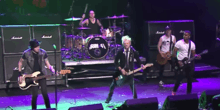
In 2001, Sum 41 achieved mainstream success. The band's song "Fat Lip" peaked at number 66 on the Billboard Hot 100 chart,[78] peaked at number 1 on the Modern Rock Tracks chart,[79] and was constantly at number 1 on MTV's Total Request Live.[80] Sum 41's album All Killer No Filler was certified platinum by the Recording Industry Association of America in August 2001.[81] In 2001, American Hi-Fi achieved mainstream success. On August 4, 2001, the band's song "Flavor of the Weak" peaked at number 41 on the Billboard Hot 100 chart.[82] On August 18, 2001, "Flavor of the Weak" by American Hi-Fi peaked at number 15 on the Mainstream Top 40 chart.[83] In 2002, New Found Glory's song "My Friends Over You" peaked at number 85 on the Billboard Hot 100.[84] The band's album Sticks and Stones was certified gold by the Recording Industry Association of America in September 2002.[85] Saves the Day's Through Being Cool (1999) would later pave the way for a new wave of pop punk, influencing bands such as Fall Out Boy, My Chemical Romance and Taking Back Sunday.[86]
Good Charlotte achieved mainstream success with its album The Young and the Hopeless, which was certified 3x platinum by the Recording Industry Association of America.[87] Good Charlotte's self-titled album was certified gold by the Recording Industry Association of America.[88] Good Charlotte's song "Lifestyles of the Rich and Famous" peaked at number 6 on the Mainstream Top 40 chart[89] and number 20 on the Billboard Hot 100 chart.[90] The band's "The Anthem" peaked at number 11 on the Mainstream Top 40 chart[89] and number 43 on the Billboard Hot 100 chart.[90] Good Charlotte's song "Girls & Boys" peaked at number 10 on the Mainstream Top 40 chart[89] and number 48 on the Billboard Hot 100 chart.[90]
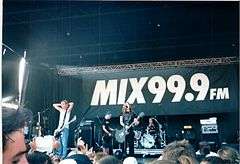
Canadian solo artist Avril Lavigne, often referred by media and critics as the "Pop Punk Queen",[91][92][93][94][95] found commercial success in 2002, with her punk-influenced pop sound.[96][97][98] Lavigne's album Let Go was certified 6x platinum by the Recording Industry Association of America in April 2003,[99] the album is considered as a highlight in the pop-punk scene and paved the way for the success of female-driven punk-influenced pop rock music, such as Paramore, Skye Sweetnam, Fefe Dobson, Lillix, Kelly Osbourne, Krystal Meyers, Tonight Alive, Hey Monday, among others as being a direct result.[100][101][102][103][104][105] Fellow Canadian artist Simple Plan experienced commercial success in 2003. Simple Plan's song "I'd Do Anything" peaked at number 16 on the Mainstream Top 40 chart in March 2003. The band's song "Addicted" peaked at number 11 on the Mainstream Top 40 chart in August 2003. Simple Plan's song "Perfect" peaked at number 5 on the Mainstream Top 40 chart in December 2003.[106]
The Ataris achieved mainstream success in 2003 with its cover of the song "The Boys of Summer". The Ataris' cover of "The Boys of Summer" peaked at number 20 on the Billboard Hot 100.[107] Yellowcard achieved mainstream success in 2004 with its song "Ocean Avenue". "Ocean Avenue" peaked at number 13 on the Mainstream Top 40 chart.[108] Blink-182's fifth studio album, Blink-182 (2003), sold 2.2 million copies in the United States.[109]
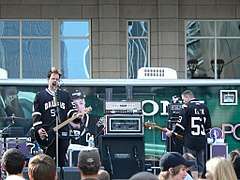
In 2004, Good Charlotte released its album The Chronicles of Life and Death, led by the lead single "Predictable". The album was certified platinum by the Recording Industry Association of America in December 2004.[110] "Predictable" by Good Charlotte peaked at number 20 on the Mainstream Top 40 chart.[89] The band Bowling for Soup achieved mainstream success in 2004. Bowling for Soup's song "1985" peaked at number 10 on the Mainstream Top 40 chart. Bowling for Soup's song "Girl All the Bad Guys Want" peaked at number 17 on the Mainstream Top 40 chart. The band's song "Almost" peaked at number 21 on the Mainstream Top 40 chart. Bowling for Soup's song "Ohio (Come Back to Texas)" peaked at number 35 on the Mainstream Top 40 chart.[111] Bowling for Soup's single "1985" was certified gold by the Recording Industry Association of America in November 2004. In January 2008, the single was certified platinum by the Recording Industry Association of America.[112] My Chemial Romance released their breakthrough album Three Cheers For Sweet Revenge which has sold over a million copies in the United States. In the mid-2000s, Green Day became mainstream again with its album American Idiot. The Green Day album American Idiot was certified 6x platinum by the Recording Industry Association of America.[113]
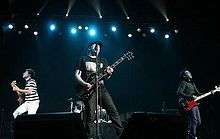
Emo pop, a fusion genre combining emo and pop punk, became popular in the mid-2000s, with record labels such as Fueled by Ramen releasing platinum albums from bands including Fall Out Boy, Panic! at the Disco, Red Jumpsuit Apparatus and Paramore.[114] Devon Maloney of MTV News wrote: "While many pop punk fans adamantly deny any association between their favorite acts and those labeled "emo," crossover bands who melded the two have gradually put both genres in the same scene-boat."[115] Fall Out Boy achieved mainstream success with its 2005 album From Under the Cork Tree, which was certified 2× platinum by the Recording Industry Association of America in January 2006.[116] During the mid–late 2000s, three Fall Out Boy songs were on the top ten of the Billboard Hot 100.[117] Although Fall Out Boy had been a staple of the Chicago hardcore scene, where they mixed pop sensibilities with hardcore punk, they are widely considered a pop punk and emo pop act.[118][119]
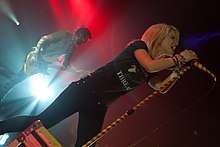
The All-American Rejects found success with Move Along (2005), which inspired three top 15 singles.[120] Panic! at the Disco scored a hit single, "I Write Sins, Not Tragedies", which peaked at number 7 on the Billboard Hot 100[121] and won the band a 2006 MTV Video Music Award for Video of the Year.[122] Avril Lavigne had success with the single "Girlfriend", which peaked at number one on the Billboard Hot 100 in May 2007 and sold over 10 million copies worldwide.[123] Her platinum album, The Best Damn Thing,[124] sold around 8 million copies worldwide, making it the top-selling pop punk album of 2007.[125][126] Paramore achieved mainstream success in the late 2000s. During the late 2000s, many Paramore songs were on the Billboard Hot 100. Paramore's song "Misery Business" peaked at number 26 on the Billboard Hot 100 in January 2008. Paramore's song "Crushcrushcrush" peaked at number 54 on the Billboard Hot 100 in January 2008 and the band's song "That's What You Get" peaked at number 66 on the Billboard Hot 100 in August 2008. Also, Paramore's song "Ignorance" peaked at number 67 on the Billboard Hot 100 in July 2009.[127] Paramore's song "Careful" peaked at number 78 on the Billboard Hot 100 in October 2009.[128] Paramore's album Riot! was certified 2x platinum by the Recording Industry Association of America.[129]
Several pop punk bands took different directions in the late 2000s, with Panic! at the Disco crafting the Beatles-inspired, baroque pop-styled record Pretty. Odd. (2008) and Fall Out Boy experimenting with glam rock, blues rock and R&B on Folie a Deux (2008), both of which created fan confusion and backlash. As of 2013, Folie a Deux has sold approximately 500,000 copies in the United States, compared to their first hit album, From Under the Cork Tree, which has a total of 2.7 million record sales in the U.S. as of 2013, a representation of the backlash from their fanbase as the group experimented with a musical style differing from their pop rock background.[130][131]
Decline in mainstream popularity, hints at resurgence (2009–present)
Pop punk generally waned in mainstream popularity by the late 2000s. The genre has fallen out of mainstream radio success, with rock bands and guitars becoming rare on dance-focused pop radio.[132] While Blink-182 and Green Day continue to headline arenas and sell out their concerts,[133][134] others, such as New Found Glory and Yellowcard, have seen attendance decrease steadily.[135] Devon Maloney of MTV wrote that "Pop punk and emo bands don’t headline Coachella or Bonnaroo; they rarely, if ever, are even billed on mainstream festival stages," and notes that it has similarly disappeared from the press. The only magazines that feature pop punk bands are niche publications like Alternative Press (AP) and the occasional teen magazine, while influential pop punk magazine AMP ceased publication in 2013.[115]
– Kelen Capener of The Story So Far
The genre has experienced somewhat of a "minor renaissance."[137] Several pop punk bands have embarked on anniversary tours, playing some of their most popular albums in full. While some members of these bands have had mixed feelings about these performances, quite often these tours sell as well as or better than the first time around.[115] Club promoters in the United Kingdom have created nights based around lasting appreciation of the genre, including Pop Punk Ain't Dead in Brighton, Hello Bastards in Leeds, Say It Ain't So in London and What's My Age Again?, a night celebrating "pop-punk, youthful abandon and teenage riot".[138] The Warped Tour still attracts hundreds of thousands of attendees each year; the 2012 tour attracted 556,000 festival-goers, its third-best attendance.[115] Bobby Olivier of The Star-Ledger wrote: "The genre, like an awkward high school kid, continues to reinvent itself and Warped is pop-punk’s prom."[139]
Many pop punk bands have folded; "once essentially child stars, their members are now adult musicians hoping to move beyond the teen trappings that gave them careers."[115] Fall Out Boy and Paramore, "two bands who rocketed into the mainstream at the height (or perhaps at the tail end) of emo and pop punk’s second wave," had two number one albums—Save Rock and Roll and Paramore—side by side on the Billboard 200. Fall Out Boy along with other pop punk/punk rock bands that peaked during the early 2000s are now seen to be experimenting with the more pop side of the pop punk, in order to maintain their relevancy and keep the interest of their fanbase while gaining the appeal of the newer generations that may not relate as much to the punk themes of the 1970s.[140] Their popularity provoked conversations about the state of the genre; Maloney writes that these records "could hardly be considered pop punk at this point."[115]
Pop punk bands that achieve minimal mainstream success have seen a return to grassroots form, "the micro-operation style that yielded the results that caught the mainstream’s attention in the first place."[115] New Found Glory has continued to tour on the Warped Tour, and had their own Pop Punks Not Dead Tour, a reworking of an "old, defiant punk rock battle cry."[141] Chad Gilbert, the band's guitarist, wrote in an op-ed for Alternative Press entitled "Why Pop-Punk's Not Dead—And Why It Still Matters Today": "This isn't a dead genre, and just because there isn't a song on the radio to clarify that shouldn't matter. ... Pop-punk means something to a lot of people and to me, having success as a band in our genre is about longevity, touring a lot and staying true to your fans. It's about us putting our lives on a plate for our fans to take what they want and not jeopardizing our integrity for any reason."[135]

A new wave of pop punk groups had sprung up sometime around 2010.[142] Dave Beech of Clash noted that these groups were "[d]arker and more mature" than those previously, taking influence "and occasional indifference" from 1990s emo.[142] On The Wonder Years' The Upsides (2010), vocalist Dan Campbell sung about "His early twenties soul-searching and tales of strife" which "resonated with a [new] generation, inspiring countless imitators in the process."[143] This pushed Campbell to "the forefront of a new wave", and the album influencing a new wave of pop punk bands.[143] The Story So Far's second album, What You Don't See (2013), "cemented their place at the top table of nu pop-punk".[144] Rock Sound included The Wonder Years' The Greatest Generation on their best albums of 2013 list, calling it "the defining album of what may well have been the genre's best year for a decade."[145] Kerrang! said the album "ripped up the pop-punk blueprint" pushing the genre to "new peaks of invention, both lyrically and musically."[146] In early 2014, Welsh band Neck Deep released their debut album Wishful Thinking, which Rock Sound later called it "the greatest UK pop-punk record of all time."[147] Also in 2014, Australian band 5 Seconds of Summer's self titled album debuted at number 1 on the Billboard 200 chart and in many other countries, prompting Alternative Press to describe the band as important to the marketing of the pop-punk scene.[148]
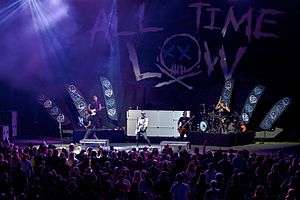
In 2015, All Time Low's Future Hearts brought the band a career best Billboard 200 number 2 charting with 75,000 copies sold.[149] The album had been described as pop rock and power pop, as well as pop punk.[150] Neck Deep's second album Life's Not out to Get You (2015) hit number 8 on the UK charts[151] and number 17 on the Billboard 200.[152] Blink-182's seventh album California debuted at number one on the Billboard 200, becoming their first number one since Take Off Your Pants and Jacket in 2001. The first single from the album, "Bored to Death", reached the number one spot on Alternative Songs chart.[153] JR Griffin of Rolling Stone "The group is aiming to recapture its "golden-age" vibe."[154] In October 2016, Green Day released its twelfth studio album Revolution Radio.[155] The album debuted at number 1 on the Billboard 200.[156] In the same month Sum 41 also released their comeback album 13 Voices which peaked at number 22 on the Billboard 200 and number 6 on the Canadian chart. In 2017, Paramore released its fifth album titled After Laughter. The album completely departed from their pop punk sound for the new wave and synth-pop sound from the '80s. Yellowcard broke up in 2017, playing its final show on March 25. Also in 2017 Neck Deep's third album The Peace and the Panic hit number 4 in both the US and the UK.[157][158]
The decline in popularity of mainstream pop punk, coupled with the closure of many mid-size venues associated with the genre, has resulted in many venues and labels returning to the DIY ethic that first spawned the punk movement.[159][160][161] This has gone hand-in-hand with a resurgence in bands more influenced by this ethic and music from that era, such as Iron Chic, Worriers and RVIVR in the United States and Martha, Great Cynics and Pardon Us in the UK.
Subgenres and fusion genres
Neon pop
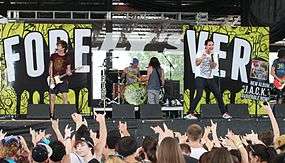
Neon pop is a subgenre of pop punk that makes notable use of synthesizers. Alternative Press writer Tyler Sharp wrote that by the late 2000s, pop punk had taken "on a new, synth-laden face."[162] While this wasn't the first instance that "a band decided to put fuzzy keys over their chord progressions, but it was a time when that formula was perfected."[162] Kika Chatterjee of Alternative Press added that the late 2000s "brought in glowing synths and poppy melodies that shifted the entire definition of [pop punk]", giving it the "neon" moniker.[163] Sharp listed songs by Cobra Starship, the Secret Handshake,[162] the Maine, and Forever the Sickest Kids, among others[164] as songs "from pop punk's neon era."[162] In addition, Chatterjee listed songs by the Cab, A Rocket to the Moon and Sing It Loud, among others.[163] Sharp noted that Forever the Sickest Kids' debut album Underdog Alma Mater (2008) was "a big moment" for the genre.[164]
Emo pop
Emo pop (or emo pop punk) is a subgenre of both emo and pop punk.[165] AllMusic describes emo pop as blending "youthful angst" with "slick production" and mainstream appeal, using "high-pitched melodies, rhythmic guitars, and lyrics concerning adolescence, relationships, and heartbreak."[166] The Guardian described emo pop as a cross between "saccharine boy-band pop" and emo.[167]
Weezer's Pinkerton (1996) was seen by Spin as "a groundbreaking record for all the emo-pop that would follow."[168] According to Nicole Keiper of CMJ, Sense Field's Building (1996) pushed the band "into the emo-pop camp with the likes of the Get Up Kids and Jejune".[169] As emo became commercially successful in the early 2000s, emo pop was popular with Jimmy Eat World's 2001 album Bleed American and the success of its single "The Middle".[166]
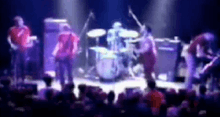
Emo pop developed during the 1990s. Jimmy Eat World,[166] the Get Up Kids[170] and The Promise Ring[171] were early emo-pop bands. The emo pop style of Jimmy Eat World's album, Clarity,[172] influenced later emo.[173]
Emo pop became successful during the late 1990s, with its popularity increasing in the early 2000s. The Get Up Kids sold over 15,000 copies of their debut album, Four Minute Mile (1997), before signing with Vagrant Records. The label promoted them, sending them on tours to open for Green Day and Weezer.[174] Their 1999 album, Something to Write Home About, reached number 31 on Billboard's Top Heatseekers chart.[175]
As emo pop coalesced, the Fueled by Ramen label became a center of the movement and signed Fall Out Boy, Panic! at the Disco, and Paramore (all of whom had been successful).[166] Two regional scenes developed. The Florida scene was created by Fueled by Ramen; midwest emo-pop was promoted by Pete Wentz, whose Fall Out Boy rose to the forefront of the style during the mid-2000s.[166][176][177] Cash Cash released Take It to the Floor (2008); according to AllMusic, it could be "the definitive statement of airheaded, glittery, and content-free emo-pop[178] ... the transformation of emo from the expression of intensely felt, ripped-from-the-throat feelings played by bands directly influenced by post-punk and hardcore to mall-friendly Day-Glo pop played by kids who look about as authentic as the "punks" on an old episode of Quincy did back in the '70s was made pretty much complete".[178] You Me at Six released their 2008 debut album, Take Off Your Colours, described by AllMusic's Jon O'Brien as "follow[ing] the 'emo-pop for dummies' handbook word-for-word."[179] The album was certified gold in the UK.[180]
Easycore

Easycore (less commonly known as popcore, dudecore, softcore, happy hardcore, and EZ)[181] is a subgenre of melodic hardcore that mixes elements of pop punk and different forms of hardcore punk, particularly metalcore and post-hardcore. It is characterized by its use of melodies commonly found in pop punk fused with breakdowns found in post-hardcore and hardcore punk.[182] A number of groups also take influence from metal and make use of unclean vocals.[183] The genre's roots come from early 2000s pop punk with groups such as New Found Glory and Sum 41 being highly influential in its development (with the former naming the genre on a tour known as the "Easycore tour").[181] The easycore sound later emerged in the mid-to-late 2000s and early 2010s by bands such as Chunk! No, Captain Chunk!,[184] A Day to Remember, and Four Year Strong.[181] Easycore has since seen a bit of a decrease in popularity.[185]
See also
Citations
- 1 2 3 "Punk-Pop Music Genre Overview". AllMusic.
- 1 2 3 Lamb, Bill (March 10, 2011). "Punk Pop". About.com (IAC). Retrieved 2011-08-19.
- 1 2 3 4 5 Anthony, David; Heller, Jason; Ryan, Kyle (March 6, 2014). "A beginner's guide to the bouncy buzz of pop-punk". The A.V. Club.
- ↑ Greenwald, Andy (November 21, 2003). "Screamo 101". Entertainment Weekly.
- ↑ "Skatepunk". AllMusic.
- ↑ Cooper, Ryan. "The Subgenres of Punk Rock". About.com. Retrieved March 4, 2017.
- 1 2 3 4 5 6 Crane, Matt (April 17, 2014). "The 5 great eras of pop-punk, from the '70s to today". Alternative Press.
- ↑ "The Modpoppunk Archives". Punkmodpop.free.fr. 2011-07-08. Archived from the original on 2011-08-12. Retrieved 2011-08-19.
- ↑ "The Ramones – Classic US Punk – Discography – Albums". Punk77.co.uk. Retrieved 2011-08-19.
- ↑ Cooper, Ryan. "Punk Subgenres, Continued". About.com.
- ↑ Bessman 1993, p. 16; Carson 1979, p. 114; Simpson 2003, p. 72; McNeil 1997, p. 206.
- ↑ Rockwell 1977, p. C22
- ↑ "The Buzzcocks, Pop Punk Pioneers". Punkmusic.about.com. Retrieved 2011-08-19.
- ↑ Cooper, Ryan. "The Buzzcocks, Founders of Pop Punk". About.com. Retrieved on December 16, 2006.
- ↑ Archived November 20, 2006, at the Wayback Machine.
- ↑ Archived October 1, 2007, at the Wayback Machine.
- 1 2 Nicholas Pell (July 9, 2013). "The 5 Best Pre-Dookie Pop-Punk Records". LA Weekly. Retrieved September 12, 2013.
- ↑ allmusic ((( The Jam > Biography )))
- ↑ Archived October 9, 2008, at the Wayback Machine.
- ↑ "Bad Religion Biography: Contemporary Musicians". Enotes.com. Retrieved 2011-08-19.
- ↑ Heller, Jason (April 11, 2002). "Bad Religion – The Process of Belief (Epitaph)". Westword. Retrieved 2011-08-19.
- ↑ Myers 2006, p. 52.
- ↑ Yohannan 1984, p. 66.
- 1 2 3 McLeod, Kembrew. "The Mr. T Experience | Biography & History". AllMusic.
- ↑ Monger, James Christopher. "Jawbreaker | Biography & History". AllMusic.
- ↑ DeRogatis 2003, p. 357
- ↑ Caramanica 2012
- 1 2 3 Strauss 1995
- ↑ D'Angelo, Joe, "How Green Day's Dookie Fertilized A Punk-Rock Revival", MTV.com, September 15, 2004. Retrieved on December 3, 2007.
- ↑ "Green Day - Chart history (Alternative Songs)". Billboard.
- 1 2 "Green - Chart history (Radio Songs)". Billboard.
- 1 2 "Green Day - Chart history (Pop Songs)". Billboard.
- ↑ "American album certifications – Green Day – Dookie". Recording Industry Association of America. If necessary, click Advanced, then click Format, then select Album, then click SEARCH.
- ↑ "American album certifications – The Offspring – Smash". Recording Industry Association of America. If necessary, click Advanced, then click Format, then select Album, then click SEARCH.
- ↑ Graff, Gary (May 21, 2012). "The Offspring Still Fly as 'Days Go By' Rises on Rock Charts". Billboard.
- 1 2 Gold 1994
- ↑ Frey, Tracey. "Review: Over It". AllMusic. Retrieved 2008-10-26.
- ↑ Shoot the Moon: The Essential Collection (CD liner notes). Face to Face. Westlake Village, California: Antagonist Records. 2005. ANT2941.
- ↑ Fucoco, Christina (November 1, 2000), "Punk Rock Politics Keep Trailing Bad Religion" Archived 2009-10-15 at the Wayback Machine., liveDaily. Retrieved on September 1, 2008.
- ↑ "Rancid - Chart history". Billboard.
- ↑ "American album certifications – The Offspring – ...And Out Come the Wolves". Recording Industry Association of America. If necessary, click Advanced, then click Format, then select Album, then click SEARCH.
- ↑ Eliezer 1996, p. 58; Eliezer 1997–1998, p. YE-16
- ↑ "Goldfinger - Chart history (Radio Songs)". Billboard.
- ↑ "Goldfinger - Chart history (Alternative Songs)". Billboard.
- ↑ Diehl 2007, pp. 2, 145, 227.
- ↑ "Sex Pistols' John Lydon Brands Green Day 'Punk Imitators' | Live4ever Ezine". Live4ever.uk.com. Retrieved 2013-02-26.
- ↑ "Green Day Fail To Impress Punk Icon". Contactmusic.com. Retrieved 2013-02-26.
- ↑ Myers 2006, p. 120.
- ↑ "American album certifications – Blink-182 – Dude Ranch". Recording Industry Association of America. If necessary, click Advanced, then click Format, then select Album, then click SEARCH.
- ↑ "blink-182 - Chart history (Radio Songs)". Billboard.
- ↑ "Eve 6 - Chart history". Billboard.
- ↑ "American album certifications – Eve 6 – Eve 6". Recording Industry Association of America. If necessary, click Advanced, then click Format, then select Album, then click SEARCH.
- ↑ "Act Your Age - Home Grown | Awards | AllMusic". AllMusic. Retrieved 2015-11-18.
- ↑ "Half-Baked - Original Soundtrack | Songs, Reviews, Credits | AllMusic". AllMusic. Retrieved 2015-11-18.
- ↑ "SoundtrackINFO: Homegrown Soundtrack (complete album tracklisting)". www.soundtrackinfo.com. Retrieved 2015-11-18.
- ↑ "American album certifications – Mxpx – Slowly Going the Way of the Buffalo". Recording Industry Association of America. If necessary, click Advanced, then click Format, then select Album, then click SEARCH.
- ↑ "Slowly Going the Way of the Buffalo - MxPx | Awards | AllMusic". AllMusic. Retrieved 2015-11-18.
- ↑ "MxPx - Chart history | Billboard". www.billboard.com. Retrieved 2015-11-18.
- ↑ "Unwritten Law - Unwritten Law | Awards | AllMusic". AllMusic. Retrieved 2015-11-25.
- ↑ "Waste of Mind - Zebrahead | Awards | AllMusic". AllMusic. Retrieved 2016-01-05.
- ↑ "American album certifications – The Offspring – Americana". Recording Industry Association of America. If necessary, click Advanced, then click Format, then select Album, then click SEARCH.
- ↑ Diehl 2003, p. 72.
- ↑ "The Offspring - Chart history (Pop Songs)". Billboard.
- ↑ "American album certifications – Blink-182 – Enema of the State". Recording Industry Association of America. If necessary, click Advanced, then click Format, then select Album, then click SEARCH.
- ↑ Montgomery, James (February 9, 2009). "How Did Blink-182 Become So Influential?". MTV. Retrieved October 3, 2018.
- ↑ "blink-182 - Chart history (The Hot 100)". Billboard.
- ↑ "Lit - Chart history (The Hot 100)". Billboard.
- ↑ "Lit - Chart history (Alternative Songs)". Billboard.
- ↑ "Alternative Songs - 1999 Archive". Billboard. Retrieved February 2, 2017.
- ↑ "New Found Glory - New Found Glory | Awards | AllMusic". AllMusic. Retrieved 2016-02-07.
- ↑ "SR-71 - Chart history". Billboard.
- ↑ "American album certifications – Jimmy Eat World – Jimmy Eat World". Recording Industry Association of America. If necessary, click Advanced, then click Format, then select Album, then click SEARCH.
- ↑ "Jimmy Eat World - Chart history". Billboard.
- ↑ "blink-182 - Chart history (Billboard 200)". Billboard.
- ↑ "Blink-182 Opens At No. 1, Sugar Ray Debuts High". Billboard. June 21, 2001.
- ↑ "American album certifications – Blink-182 – Take Off Your Pants and Jacket". Recording Industry Association of America. If necessary, click Advanced, then click Format, then select Album, then click SEARCH.
- ↑ Ken Leighton (September 14, 2011). "Naming Rights". San Diego Reader. Archived from the original on February 15, 2013. Retrieved October 28, 2016.
- ↑ "Sum 41 - Chart history (The Hot 100)". Billboard.
- ↑ "Sum 41 - Chart history (Alternative Songs)". Billboard.
- ↑ "Recap: August 2001". ATRL.
- ↑ "American album certifications – Sum 41 – All Killer No Filler". Recording Industry Association of America. If necessary, click Advanced, then click Format, then select Album, then click SEARCH.
- ↑ "American Hi-Fi - Chart history (The Hot 100)". Billboard.
- ↑ "American Hi-Fi - Chart history (Pop Songs)". Billboard.
- ↑ "New Found Glory - Chart history". Billboard.
- ↑ "American album certifications – New Found Glory – Sticks and Stones". Recording Industry Association of America. If necessary, click Advanced, then click Format, then select Album, then click SEARCH.
- ↑ McGuire, Colin (November 3, 2014). "Saves The Day look back on 15 years of 'Through Being Cool'". Alternative Press. p. 1. Retrieved September 10, 2015.
- ↑ "American album certifications – Good Charlotte – The Young and the Hopeless". Recording Industry Association of America. If necessary, click Advanced, then click Format, then select Album, then click SEARCH.
- ↑ "American album certifications – Good Charlotte – Good Charlotte". Recording Industry Association of America. If necessary, click Advanced, then click Format, then select Album, then click SEARCH.
- 1 2 3 4 "Good Charlotte - Chart history (Pop Songs)". Billboard.
- 1 2 3 "Good Charlotte - Chart history (The Hot 100)". Billboard.
- ↑ Gamble, Ione. "11 Times Kelly Osbourne's Early 2000 Outfits Were Our Pop Punk Inspiration — PHOTOS". Retrieved 2017-04-15.
Whether owning the red carpet with then-bestie and reigning queen of pop-punk Avril Lavigne.
- ↑ Zulch, Meg. "11 Avril Lavigne Trends That We All Tried To Copy In The Early 2000s — PHOTOS". Retrieved 2017-04-15.
Although many of these trends may be a little out of date now, let's give thanks to the pop punk queen who took androgyny to the eyes of the masses and inspired many young masculine people of all gender identities along the way.
- ↑ Lindner, Emily. "Which 2004 Pop Punk Princess Are You?". Retrieved 2017-05-15.
Where have all the pop punk girls gone? Sure, Avril Lavigne still reigns as queen, but when it comes to the kind of angsty, badass ladies who gave us an outlet in the early aughts, we're running short these days.
- ↑ Zhou, Monica. "Queen of Pop Punk Avril Lavigne Returns to Hong Kong for The Black Star Tour". Retrieved 2017-05-15.
Queen of pop punk Avril Lavigne is returning Hong Kong to rock again the stage of AsiaWorld-Arena since her live performance there in 2007. This time, she is bringing with her the Black Star Tour.
- ↑ Gracie, Bianca. "AVRIL LAVIGNE'S 'LET GO' TURNS 15, HAILING THE POP-PUNK QUEEN". Retrieved 2017-06-04.
Avril Lavigne's 'LET GO' Turns 15, Hailing The Pop-Punk Queen.
- ↑ "" It marked a return to the bratty, spunky punk-pop of Let Go..." Her first album released on 2002". Retrieved 16 October 2017.
- ↑ "Avril Lavigne biography - 8notes.com". www.8notes.com. Retrieved 16 October 2017.
- ↑ "Avril Lavigne Biography – Facts, Birthday, Life Story". Biography.com. 1984-09-27. Retrieved 2013-02-26.
- ↑ "American album certifications – Avril Lavigne – Let Go". Recording Industry Association of America. If necessary, click Advanced, then click Format, then select Album, then click SEARCH.
- ↑ Frank, Alex (June 29, 2017). "Paramore's Hayley Williams Still Gets You". Fader. The Fader. Retrieved 2 November 2017.
Avril Lavigne had recently broken through, whetting the industry’s appetite for punky alternatives to Britney and Christina. “I don’t think I would’ve been signed if Avril hadn’t happened,” she says.
- ↑ Laugher, Nick. "6 Canadian albums that changed pop punk forever". Aux TV. Retrieved 16 March 2017.
- ↑ http://www.contactmusic.com/kelly-osbourne/news/kelly-osbourne.s-a-closet-avril-fan The SHUT UP! punk babe confesses she owns a copy of Avril's album LET GO
- ↑ "Pieces of Avril". The Globe and Mail. 31 Jan 2004. Retrieved 16 March 2017.
- ↑ Farber, Jim (23 May 2004). "AVRIL ON THE ATTACK The punk-pop princess may be girlier now, but she's still taking swipes". NY Daily News. Retrieved 16 March 2017.
Lavigne initiated a whole wave of assertive young female singer-songwriters, including Katy Rose, Fefe Dobson, Toby Lightman and Skye Sweetnam.
- ↑ Hammond, Amy. "Krystal Meyers is In The Spotlight". Soul Shine. Retrieved 16 March 2017.
I've been compared many a time to Avril, which I can see, but you know that's because there aren't a lot of people to compare to. There's not a lot of girls that are doing like the solo, pop/punk thing
- ↑ "Simple Plan - Chart history (Pop Songs)". Billboard.
- ↑ "The Ataris - Chart history". Billboard.
- ↑ "Yellowcard - Chart history". Billboard.
- ↑ "Blink-182: The Billboard Cover Story | Billboard". Billboard. Retrieved 2016-01-27.
- ↑ "American album certifications – Good Charlotte – The Chronicles of Life and Death". Recording Industry Association of America. If necessary, click Advanced, then click Format, then select Album, then click SEARCH.
- ↑ "Bowling for Soup - Chart history (Pop Songs)". Billboard.
- ↑ "American single certifications – Bowling for Soup – 1985". Recording Industry Association of America. If necessary, click Advanced, then click Format, then select Single, then click SEARCH.
- ↑ "American album certifications – Green Day – American Idiot". Recording Industry Association of America. If necessary, click Advanced, then click Format, then select Album, then click SEARCH.
- ↑ "Emo-Pop". AllMusic.
- 1 2 3 4 5 6 7 Devon Maloney (April 24, 2013). "What Happened to Emo?". MTV News. Retrieved September 17, 2013.
- ↑ "American album certifications – Fall Out Boy – From Under the Cork Tree". Recording Industry Association of America. If necessary, click Advanced, then click Format, then select Album, then click SEARCH.
- ↑ "Fall Out Boy - Chart history". Billboard.
- ↑ Cripps, Charlotte (April 28, 2006). "Last year, Fall Out Boy's bassist Pete Wentz attempted suicide; now the band are punk-pop gods". The Independent. London: Independent Print Limited.
- ↑ Associated Press (December 14, 2005). "Fall Out Boy takes pop route to rock success". MSNBC.com. Retrieved November 28, 2009.
- ↑ Michel, Sia (October 22, 2006). "Fresh From the Garden State, in Black Leather and Eyeliner". The New York Times.
- ↑ "Panic at the Disco - Chart history". Billboard.
- ↑ "Panic! At The Disco triumph at MTV awards". NME. September 1, 2006.
- ↑ "Avril Lavigne - Chart history". Billboard.
- ↑ "American album certifications – Avril Lavigne – The Best Damn Thing". Recording Industry Association of America. If necessary, click Advanced, then click Format, then select Album, then click SEARCH.
- ↑ "Top 50 Global Best Selling Albums : 2007" (PDF). Ifpi.org. Retrieved 2014-06-04.
- ↑ "Loading..." starsontop.com. Retrieved 16 October 2017.
- ↑ "Paramore - Chart history". Billboard.
- ↑ "Paramore - Chart history (Page 2)". Billboard.
- ↑ "American album certifications – Paramore – Riot!". Recording Industry Association of America. If necessary, click Advanced, then click Format, then select Album, then click SEARCH.
- ↑ Perpetua 2012
- ↑ Greene 2011
- ↑ Fall Out Boy, Wiz Khalifa Announce Extensive 'Boys of Zummer' Tour Rolling Stone. Retrieved January 17, 2015.
- ↑ Chris Payne (September 12, 2013). "Blink-182 Rock Brooklyn Club Gig: Live Review". Billboard. Retrieved September 12, 2013.
- ↑ James Montgomery (February 26, 2013). "Green Day Announce Club Dates, Eye Return To Arenas". MTV News. Retrieved September 12, 2013.
- 1 2 Chad Gilbert (September 29, 2011). "Why Pop-Punk's Not Dead—And Why It Still Matters Today". Alternative Press. Retrieved September 17, 2013.
- ↑ Ed Cooper (November 14, 2012). "The Story So Far: Pop-punk is a zombie". The Independent. London. Archived from the original on November 2, 2013. Retrieved September 17, 2013.
- ↑ Ian Cohen (August 2, 2013). "The Forgotten Pop-Punk Records of Summer". Grantland.com. Retrieved September 12, 2013.
- ↑ Sian Rowe (August 20, 2011). "Say It Ain't So! Club nights reanimate the pop-punk sound of Blink-182". The Guardian. Retrieved September 17, 2013.
- ↑ Bobby Olivier (July 15, 2013). "What Jersey sounds like: The power of pop-punk". The Star-Ledger. Retrieved September 17, 2013.
- ↑ Mikael Wood (May 11, 2013). "Fall Out Boy and Paramore: Coming back on top". Los Angeles Times. Retrieved September 12, 2013.
- ↑ Steve Appleford (June 25, 2012). "New Found Glory, Yellowcard Stand Up for 'Pop Punks' at Warped Tour". Rolling Stone. Retrieved September 17, 2013.
- 1 2 Beech, Dave (May 23, 2016). "Modern Baseball - Holy Ghost". Clash. Retrieved May 24, 2016.
- 1 2 Bird, ed. 2015, p. 45
- ↑ Bird, ed. 2015, p. 73
- ↑ "The 50 Best Albums Of 2013 Part Five: 10 – 1 | Photos | Rock Sound". Rocksound.tv. December 6, 2013. Retrieved July 2, 2015.
- ↑ McMahon, ed. 2014, p. 42
- ↑ Bird, ed. 2015, p. 66
- ↑ Why 5 Seconds Of Summer are more important to pop-punk than you think Alternative Press. Retrieved January 2, 2015.
- ↑ 'Furious 7' Soundtrack Moves Up To Number One. Forbes. Retrieved April 26, 2015.
- ↑ "Future Hearts - All Time Low - Songs, Reviews, Credits, Awards - AllMusic". Retrieved August 13, 2015.
- ↑ "NECK DEEP | full Official Chart History". officialcharts.com. Retrieved September 1, 2015.
- ↑ "Top 200 Albums | Billboard". billboard.com. Retrieved September 1, 2015.
- ↑ Caulfield, Keith (July 11, 2016). "Blink-182 Bumps Drake from No. 1 on Billboard 200 Albums Chart". Billboard. Prometheus Global Media. Retrieved July 11, 2016.
- ↑ Griffin, J R. "Blink-182 Restart the Pop-Punk Party". Rolling Stone. Vol. 1264.
- ↑ Erlewine, Stephen Thomas. "Revolution Radio - Green Day". AllMusic.
- ↑ Caulfield, Keith (October 16, 2016). "Green Day Earns Third No. 1 Album on Billboard 200 Chart With 'Revolution Radio'". Billboard.
- ↑ "Brand New Scores First No. 1 Album on Billboard 200 Chart With 'Science Fiction'". Retrieved 16 October 2017.
- ↑ "Official Albums Chart Top 100 - Official Charts Company". www.officialcharts.com. Retrieved 16 October 2017.
- ↑ Dunn, Kevin (16 May 2016). "How Punk Rock Kickstarted the Do-It-Yourself Record Revolution". Medium.com. Retrieved 3 March 2018.
- ↑ Welsh, April (23 December 2015). "How DIY Culture Is Thriving In The U.K." Thefader.com. Retrieved 3 March 2018.
- ↑ "HENRY ROLLINS TALKS TRUMP, SNAKES AND DIY PUNK RESURGENCE". Soundsmagazine.co.uk. 16 December 2016. Retrieved 3 March 2018.
- 1 2 3 4 Sharp, Tyler (May 17, 2016). "12 neon pop-punk songs you've already forgotten about". Alternative Press. Alternative Press Magazine, Inc. p. 1. Retrieved June 4, 2016.
- 1 2 Chatterjee, Kika (September 9, 2017). "20 neon pop-punk songs you probably forgot". Alternative Press. Alternative Press Magazine, Inc. Retrieved September 26, 2017.
- 1 2 Sharp, Tyler (May 17, 2016). "12 neon pop-punk songs you've already forgotten about". Alternative Press. Alternative Press Magazine, Inc. p. 2. Retrieved June 4, 2016.
- ↑ Patrick, Kate (June 24, 2015). "When did rock stop evolving? It hasn't: meet punk rock's children". Rocknuts. Retrieved November 26, 2017.
- 1 2 3 4 5 "Explore: Emo-Pop". AllMusic. Archived from the original on September 3, 2011. Retrieved 10 June 2011.
- ↑ Lester, Paul (December 8, 2008). "New band of the day – No 445: Metro Station". The Guardian. Retrieved June 10, 2011.
They peddle "emo-pop", a sort of cross between saccharine boy-band pop and whatever it is that bands like Panic! at the Disco and Fall Out Boy do – emo, let's be frank.
- ↑ SPIN Mobile (23 February 2011). "Weezer Reveal 'Pinkerton' Reissue Details". Spin Magazine. Archived from the original on 20 August 2011. Retrieved 11 June 2011.
- ↑ Kieper, Nicole (October 2001). "Sense Field: Tonight and Forever – Nettwerk America". CMJ New Music Monthly. CMJ Network. Retrieved 10 June 2011.
- ↑ "The Get Up Kids Prep Vinyl Reissues of 'Eudora' and 'On a Wire'".
- ↑ "Promise Ring swears by bouncy, power pop". Michigan Daily. April 12, 2001.
- ↑ "Jimmy Eat World – Clarity – Review". Stylus Magazine. Archived from the original on May 3, 2010.
- ↑ Merwin, Charles (9 August 2007). "Jimmy Eat World > Clarity > Capitol". Stylus. Archived from the original on May 3, 2010. Retrieved 16 May 2010.
- ↑ Greenwald 2003, pp. 77–78.
- ↑ "The Get Up Kids Something To Write Home About Chart History". Billboard. Retrieved January 11, 2018.
- ↑ Loftus, Johnny. "Fall Out Boy". AllMusic. Retrieved June 10, 2011.
- ↑ Futterman, Erica. "Fall Out Boy Biography". Rolling Stone. Retrieved June 10, 2011.
- 1 2 Sendra, Tim. "Take It to the Floor". AllMusic. Retrieved June 11, 2011.
- ↑ O'Brien, Jon. "Take Off Your Colours – You Me at Six | Songs, Reviews, Credits". AllMusic. Retrieved December 3, 2015.
- ↑ "Archived copy". Archived from the original on 2014-06-25. Retrieved 2016-08-29.
- 1 2 3 Edge, Citizen. "What The Hell Is: Easycore". 102.1 the Edge. Archived from the original on 2016-02-24. Retrieved 2017-09-24.
- ↑ "7 Bands Showing You Why Easycore Should Be Your Favorite Genre". 2016-06-17. Retrieved 2017-09-24.
- ↑ "The evolution of pop punk and easycore". Wolfsbane Co. Retrieved 25 January 2018.
- ↑ "Best shows to see: Paint Fumes, Bill Orcutt, Chunk! No, Captain Chunk!, Zs". Chicago Reader. Retrieved 2017-09-24.
- ↑ Edge, Citizen. "What The Hell Is: Easycore". 102.1 the Edge. Archived from the original on 2016-02-24. Retrieved 2017-09-26.
Sources
- Bird, Ryan, ed. (June 2015). "The 200 Moments that Defined Our Lifetime". Rock Sound. London: Freeway Press Inc. (200). ISSN 1465-0185.
- Caramanica, Jon (September 25, 2012). "Pop-Punk Bands, Now Grown Up". The New York Times. New York City: The New York Times Company. ISSN 0362-4331.
- DeRogatis, Jim (2003). Milk It!: Collected Musings on the Alternative Music Explosion of the 90's. Cambridge: Da Capo Press. ISBN 0-306-81271-1.
- Eliezer, Christie (September 28, 1996). "Trying to Take Over the World". Billboard. ISSN 0006-2510.
- Eliezer, Christie (December 27, 1997 – January 3, 1998). "The Year in Australia: Parallel Worlds and Artistic Angles". Billboard. ISSN 0006-2510.
- Gold, Jonathan (November 1994). "The Year Punk Broke". Spin. New York City: Spin Media. ISSN 0886-3032.
- Greene, Andy (March 18, 2011). "The 25 Boldest Career Moves in Rock History". Rolling Stone. New York City (1127). ISSN 0035-791X.
- McMahon, James, ed. (13 September 2014). "Pop-Punk's Not Bread". Kerrang!. London: Bauer Media Group (1534). ISSN 0262-6624.
- Perpetua, Matthew (February 29, 2012). "Patrick Stump: I'm a 27-Year-Old Has-Been". Rolling Stone. New York City. ISSN 0035-791X.
- Rockwell, John (March 9, 1977). "Cabaret: Tom Petty's Pop Punk Rock Evokes Sounds of 60s". The New York Times. New York City. ISSN 0362-4331.
- Strauss, Neil (February 5, 1995). "POP VIEW; Has Success Spoiled Green Day?". The New York Times. New York City. ISSN 0362-4331.
- Yohannan, Tim (December 1984). "BLOODSPORT – cassette (music review)". Maximum RocknRoll (20).
External links
- Punk pop – article about pop punk music
- The Buzzcocks, Founders of Pop Punk – article about the Buzzcock's role in developing the pop punk genre